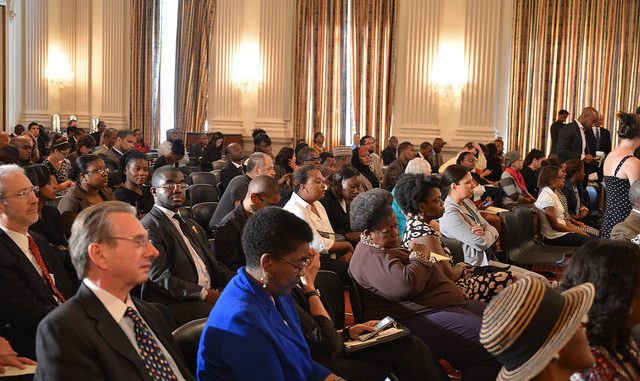
By Uchenna Ekwo
By Uchenna Ekwo
Is Nigeria a failed state? This was the central question that dominated discussion at this week’s Africa Policy Breakfast Series hosted by the United States Congress in Washington with the theme: “Instability in Northern Nigeria and the Ongoing Threat of Boko Haram Terrorists”.
As expected, Nigeria’s Ambassador to the US, Professor Ade Adefuye, provided a spirited defense for his country and denounced critics who consider Nigeria to be a failed state and pointing accusing fingers to the Western media for always providing negative news reports about Nigeria.
Convened by California Democrat, Representative Karen Bass and Co-hosted by Representative Elliot Engel, a ranking member of the House Foreign Affairs Committee; Senator Chris Coons, Chairman of Senate Subcommittee on African Affairs and Representative Chris Smith, Chairman of House African Subcommittee, the event was moderated by Ambassador Robin N Sanders, former US Ambassador to Nigeria.
Ambassador Adefuye , who was on the panel of three fielded questions from visibly angry Nigerian students and residents in the US as well as top ranking members from Nigeria’s four neighboring countries who filled one of the rooms of the Cannon Building of the House of Representatives.
Nigeria’s top diplomat unequivocally stated that Nigeria is not a failed state and compared the country’s current situation to that faced by the US in the wake of 9/11 and its aftermath.
“Should we now say because three states in the US are affected by an insurgency of this type, therefore US is a failed state, Adefuye asked? Most of you Nigerians here sit back condemning your country without coming home to see things for yourselves. Many American investors visit Nigeria regularly and they have not been scared of Boko Haram. Robin Sanders is here to tell you what she knows about Nigeria just like many congress men and women seated here.”
Boko Haram, Adefuye said, had been effectively contained, adding that for every Boko Haram attack that was carried out, 10 of such potential attacks were nipped in the bud, adding that sadly, the foreign media sees only the negative.
Adefuye assured the audience that Nigeria remained Africa’s leading investment destination and that comparing a country that has produced some of the finest soldiers fighting alongside the United States soldiers was akin to comparing Great Britain fighting the Irish Republican Army as a failed country.
He described the US as a failed state when Osama Bin-Laden bombed the twin towers or when the same US was battling Iran over the detention of American citizens under Ronald Reagan.
According to Adefuye, “The Nigerian people and government feel excessively and unfairly treated. The foreign media here promotes bad stories because it is good for the press. So there is the tendency to emphasize the negative.
“Other positive things are happening in the largest economy in the continent; a country that has for decades been championing the cause of democracy in Africa, but the media is keener on promoting the negative about it.
There are three issues raised by Nigeria’s ambassador at the Washington Breakfast event that I find troubling.
First, that the kidnapped girls have been found and the delay in releasing them to their parents is to ensure the safety of the girls. This is the second time a top Nigerian official acknowledged that the authorities in Abuja know where the girls are being held. Nigeria’s Chief of Defense Staff, Alex Badeh had boasted in early May that the government has located the whereabouts of the girls. I’m not sure how such bolster helps the public perception of the Jonathan administration which unfortunately is seen to be very weak. The most likely public reaction would be: if you knew the location of the girls, then secure their release. The parents of the children will not like to be hearing such boastful claims that government knows where the girls are and yet incapable of securing their release. The best thing for government to do is to keep quiet and continue working behind the scenes until the girls are delivered to their parents.
Second, Ambassador Adefuye did the traditional blame game: the Western media is responsible for Nigeria’s problems because it portrays the country in a negative light. While it is true that the Western media focuses more on ugly developments in most emerging countries, Nigeria’s diplomat must also concede that Nigerians and their government engage in practices that are nauseating and consequently attract adverse media publicity. It is not the fault of the Western media that Nigeria is almost synonymous with corruption while the teeming youth population has lost hope in the country due to massive unemployment, very poor healthcare, and destroyed educational system.
The ambassador and others who complain about negative portrayal of Nigeria by the western media have probably done nothing to change the situation. What efforts have wealthy Nigerians made towards investing in the media that can advocate Nigerian views internationally? All that government and giant corporations in Nigeria do is to hire New York and Washington DC public relations firms to massage their message in the United States at the expense of investing in indigenously –owned media outfits that can genuinely canvass for Nigeria. Last month the federal government hired a Washington DC public relations firm Levich for $1.2 million to lubricate the image of Nigeria in the United States on the heels of jaded public view of the Jonathan administration in the wake of the abducted Nigerian girls. Such kneejerk reactions are not only temporary and counterproductive but also a channel for corruption and denial of employment opportunity to Nigerians who honestly should be better and more informed about addressing the country’s public relations needs.
Third, Adefuye’s assertion that “Most of you Nigerians here sit back condemning your country without coming home to see things for yourselves” is not accurate. Many Nigerians travel often to the country and get more depressed on successive visits. The level of insecurity in the country is troubling to average Nigerian-American who visits to the extent that some claim that they hire personal security at a very high cost. The option of sleeping in hotels does not even guarantee safety neither is engaging police protection.
Obviously, the insecurity situation in Nigeria discourages investors to the country contrary to Adefuye’s claims. I have lost count of many people that I encountered over the past year or two who wanted to do one thing or another in Nigeria but are discouraged or skeptical because of the Boko Haram phenomenon.
Whether Nigeria is a failed state or failing state is open for debate. Adefuye and most patriotic Nigerians will argue that their country is not a failed state, but it will be disingenuous for anyone to deny the helpless security situation in the country. Another reality is that a collapse of Nigeria will have widespread repercussion for Africa and the world. Congressman, Gregory Nicks from New York recognizes this reality when he demanded that: “this is a critical time demanding a focus in a bipartisan way for the US to do more to help Nigeria contain the terrorist organization”.

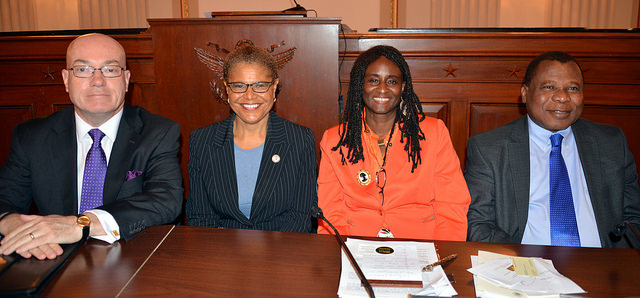

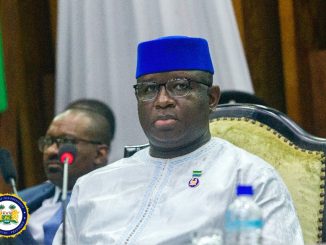
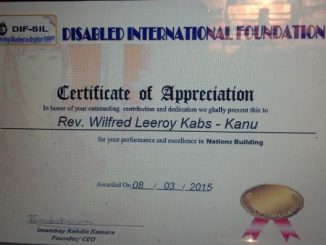
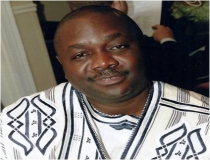
Leave a Reply